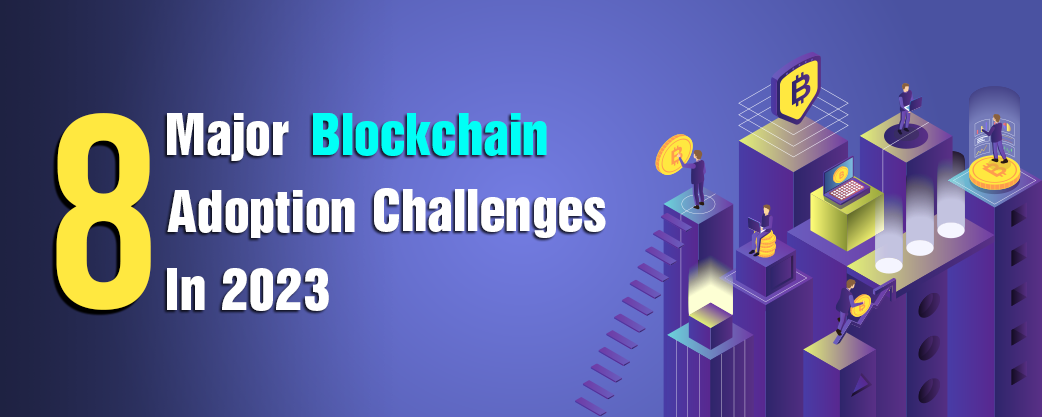8 Major Blockchain Adoption Challenges In 2023

- The world is rapidly adopting Web3, Metaverse, and Digital Virtual Assets. Meanwhile, Blockchain Technology has been touted as one of the most disruptive and innovative technologies of the 21st century. Blockchain Technology has become significant in finance, healthcare, supply chain management, and other data-managing business sectors.
- However, even after entailing a wide range of industries and sectors, blockchain technology still needs to overcome numerous challenges in overlaying the generation. In this blog post, we will catch up with eight significant challenges for blockchain adoption, even in 2023, which must be overcome to achieve its full potential in the market.
Challenges in Blockchain Technology Adoption
Let's explore the significant challenges the global people face in adopting high-technologies like blockchain technology. We are also providing you with the best possible solution to resolve the concern here:
1. Lack of Knowledge
Though blockchain technology has been around the corner for a decade, it was initially developed to power cryptocurrencies only; later on, it tremendously overlapped the other industries. However, it has expanded in different sectors like finance, healthcare, real estate, etc., and people are afraid to adopt it. The critical challenge in blockchain adoption is the need for more knowledge; people still need to be completely comfortable with the technologies and digital spaces. They fear cyber attacks and third-party hacks on their databases.
The Web3 community and blockchain technology enthusiasts can play a vital role in educating society with the best knowledge-sharing practice.
2. Security
Despite the immense growth of blockchain technology, security is still a significant concern in its adoption. Although blockchain is considered secure, it is not immune to hacks and cyber-attacks. As per the research, one of the most significant threats to blockchain security is the 51% attack, where an attacker gains control of 51% of the network's computing power, allowing them to manipulate transactions.
To address this, blockchain developers must continue improving their networks' security and implement measures to prevent such attacks.
3. Regulatory Framework
Blockchain Technology works on the DeFi (Decentralised Finance) feature, which ultimately removes the control of central authority or server. The decentralized nature of blockchain makes it difficult for governments and regulatory bodies to monitor and control its use and utilization. Also, there needs to be an effective regulation made in the use case of blockchain technology. The lack of regulation creates unacceptance and makes it challenging for businesses to adopt the technology.
Considering the concern, blockchain developers need to work with regulators to create a regulatory framework that supports innovation while ensuring the security and privacy of the business and users' data.
4. Concern of Complexity
Blockchain technology has immense potential, but its adoption could be faster. One of the primary reasons for the negligence of its adoption is the need for more user-friendly interfaces and the complexity of the technology. Though it is not quite a complex process, the lack of complete understanding makes it more difficult and complex technology among the users.
Blockchain developers must focus on creating more accessible and intuitive interfaces to make the technology more accessible to a broader audience.
5. Scalability
Besides the technology understanding, interface complexity, and security, blockchain technology's most significant challenge is scalability. As the number of users on a blockchain network grows, the system becomes more complex, and the processing of transactions becomes slower. The current blockchain infrastructure can handle only a limited number of transactions per second, which needs to be improved to support large-scale use cases.
To overcome this, blockchain developers must find ways to increase the speed and throughput of transactions on the blockchain hassle-free as per the user's convenience.
6. Interoperability
The term "interoperability" describes how well various blockchain networks can interact and communicate with one another. Currently, numerous blockchain platforms need to be compatible with each other, making it difficult for developers to create decentralized applications that can be used across multiple networks.
Interoperability will be essential in creating a more interconnected and robust blockchain ecosystem.
7. Energy Consumption
Besides the limited data management resources or scalability in blockchain, the energy consumption required to run blockchain networks is another major technology challenge. As the number of transactions on the network grows frequently, so does the energy consumption needed. This has led to concerns about the environmental impact of blockchain technology.
Blockchain technology developers need to find more ways to reduce the energy consumption of blockchain networks to make them more sustainable.
8. Governance
Besides it all, it is high time to address the challenge of governance in blockchain technology. Governance refers to a systematic decision made about the direction and development of blockchain networks. Currently, there needs to be a clear governance structure for regulating blockchain networks, which can lead to conflicts and further impede progress.
Blockchain developers must work to create governance structures that are transparent and inclusive.
In conclusion, blockchain technology has come a long way, but significant challenges must be overcome to accomplish the goal of futuristic industry adoption.
Blockchain technology developers must focus on addressing and improving the aforementioned significant challenges to create a more robust and sustainable blockchain ecosystem. With the right approach, blockchain technology could revolutionize how we interact with each other and the world around us.
By Riteshu Sen Jaiswar
28-march












